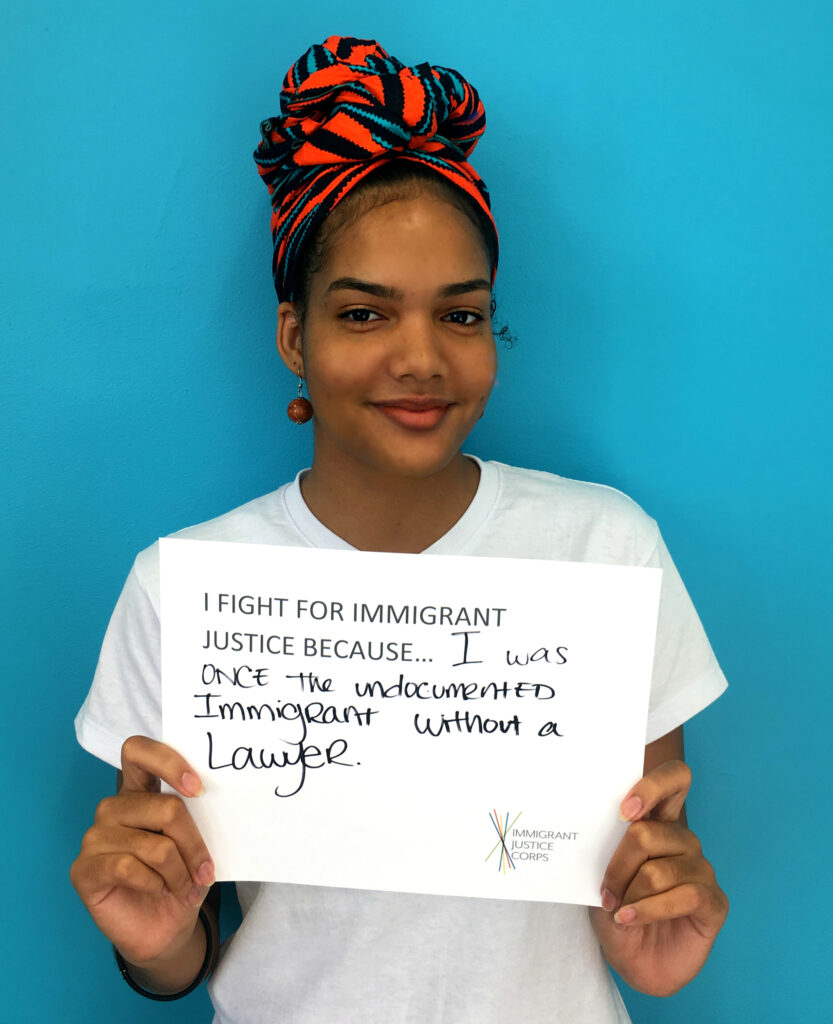Where are they now?: Audrey Mulholland
Audrey Mulholland, a 2019 Justice Fellow with Texas RioGrande Legal Aid, shares her takeaways from the fellowship, how the experience impacts her work today, and advice for future Fellows.
During her fellowship, Audrey worked out of the Dilley detention center (also known as the South Texas Family Residential Center), which was housing mothers and children in ICE detention. In 2021, when Texas Governor Greg Abbott started Operation Lone Star, Audrey pivoted to advising asylum seekers on the impacts of their arrests under the operation. She helped to provide Padilla advice, which is Supreme Court-mandated immigration counsel and advice that defendants should be given before taking any plea bargain.
When TRLA’s public defender’s office split off to become the Texas RioGrande Public Defender, Audrey joined the new organization, becoming director of the Padilla-Immigration team.
What brought you to IJC?
When I was finishing up law school, I knew that I wanted to be involved in the immigration and international human rights fields. Ultimately, the reason why I applied for IJC is because of the fellowship and community that it offered – not only having to rely on the support of supervisors when I first started off my career, but also being able to reach out to other new attorneys in the field of immigration. What IJC offered in terms of community, of people in the same field dealing with the same issues, of not only being able to come together for advice, but also to commiserate and lament on the state of immigration law, is what drew me to the fellowship and what I got out of it too.
What is your main takeaway from your time as a Fellow?
I think one of the things is that it’s really important to do this work in community. So often, just because of the high volume of work that we have as immigration practitioners, it’s easy to kind of be siloed. But our jobs are extremely difficult. We’re constantly being confronted by vicarious trauma, by rapidly changing policies, by an immigration system that is broken, and so doing that hard work in community and being able to talk through things with other people is so important.
In one instance I had a client, based in New York, and I had previously taken on her BIA appeal while in detention. She was SIJS eligible, but I hadn’t been able to place her case, and I’d been trying for a couple of years. So I sent out another Hail Mary on the IJC listserv. One of the current IJC Fellows was willing to take on her case and got her the state court predicate order, and filed the SIJS application within two weeks of me referring the case, just three days before her 21st birthday, before she aged out. To me, that’s a perfect example of how this fellowship and this community can work together.
How do you feel your experience as a Fellow impacts your work today?
I’m still pretty strongly connected to the IJC network, not just in terms of trying to refer out cases, but also just collaborating on different issues. I think that’s a tool that I will use probably for the rest of my time practicing as an immigration attorney. I also made close friends through the fellowship, and we try and intentionally meet up in-person and share in our wins and losses. It is this community that has helped build my resiliency.
But I also think that just being a part of the fellowship was a good guide for how to mentor and manage people. In my current role, I’m leading a small team, trying to think constantly about how to build up capacity and build up knowledge. IJC connected me to a lot of resources that I can now use for my own staff as well.
Advice for a Fellow on their first day?
My biggest piece of advice is don’t be afraid to ask questions, but I don’t mean that in the sense of just asking when not knowing how to do something. But I think it’s don’t be afraid to ask questions of why systems are the way they are. Because I think the more that we’re in this field, unfortunately the more certain things become normalized to us, certain unjust systems and structures become normalized. It is really so beneficial when new people join and ask questions and push back on why things are done this way, or why can’t we bring up this new legal argument or this old legal argument that’s still valid. Don’t be afraid to be creative or ask questions or push back, because I think that is what this profession always needs – people who are willing to bring fresh ideas and fresh eyes to challenging this immigration industrial complex that hasn’t changed in many, many years.
